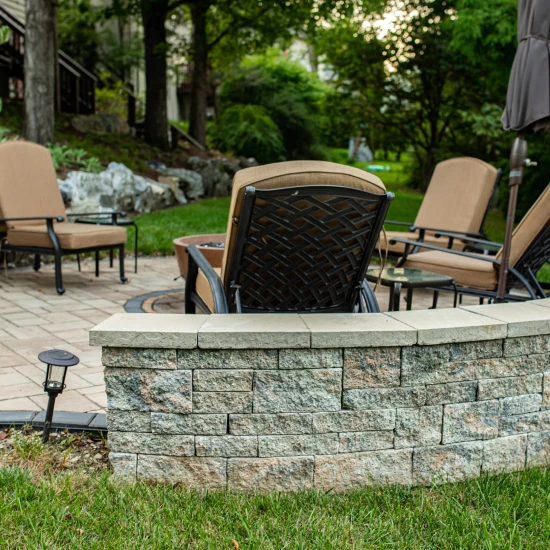Do you need to make the area flat so the pedestrians can stop climbing on the hilly sides of your backyard? Or do you need more functional space to create the landscape design of your dreams? Is the erosion treating to increase flooding in your yard, clog the drains, or kill your plants by destroying the soil quality?
Consider the backyard retaining wall cost you as one of the essential steps in your landscape project. Explore all the factors influencing the cost for retaining wall so you can make the best choice within your budget.
Factors Influencing the Cost
How much does a 3-foot retaining wall cost? There is no universal answer because factors such as materials, thicknesses, additional features, and differences in construction cost across the country determine the retaining wall prices.
Material Types
Material influences the retaining wall cost per foot in two ways – the cost of the material and the cost of labor required for that specific material.
Here is a retaining wall options and costs range:
- Concrete
- Precast – 20$ – 30$ per sq ft
- Poured-in-place 30$ – 50$ per sq ft
- Concrete blocks – 15$ – 25$ per sq ft
- Stone
- Natural stone 25$ – 75$ per sq ft
- Veneer stone 25$ – $45 per sq ft
- Wood: 15$ – 30$ per sq ft
- Brick 20$ – 35$ per sq ft
- Other materials:
- Gabion 5$ – 40$ per sq ft
- Steel 30$ – 60$ per sq ft, etc.
Wall Height and Length
The wall dimensions determine how much does a retaining wall cost, because of the difference in materials, labor, site preparation works, etc. The height, length, and wall thickness define the required level of engineering skills, the material amount, and the labor cost. Tall and short walls need additional thickness to overcompensate for the reduced length, so these may be more expensive.
In addition, tall and long walls require extensive preparation, and they will cost significantly more than smaller constructions.
Residential retaining walls are typically between three and six feet tall, with an average thickness of six to 24 inches. Concrete walls are the thinnest, and brick walls are the thickest. The length depends on the size of your yard, and it can go anywhere from 10 to 100 feet.
Typical price per square foot is from 15$ to 60$. The cost of small retaining wall differs significantly from walls taller than 3 feet, because of the advanced expert skills needed for the taller structures.
Design Complexity
Simple retaining walls feature straight lines and uniform shapes. These are easier to construct, and their cost impact is low. Only basic materials and skills are required for these to fulfill their purpose.
On the other hand, complex designs with curved patterns, terraces, or steps need a skillful engineer to design and a great team of technicians to build. For example, terraces are ideal on steep slopes because of the pressure reduction on single walls.
However, terrace retaining walls are expensive because they need more material and labor. Similarly, steps require additional excavation, forming, and complex finishing steps. Constructing them requires more time and money.
Excavation and Grading Costs
The contractor determines how much to charge for a retaining wall after they assess the complexity and depth of the required excavation. Removing the soil and vegetation to build the foundation base can be challenging because of the soil type and terrain conditions.
For demanding terrain, the contractor must use heavy machinery, which significantly raises the costs. In situations with straightforward conditions, the price is lower, and the workers need less time to complete the wall.
Labor Costs
How much to build a retaining wall depends a lot on the cost of labor in your region. Typically, the West Coast has the highest labor work prices for retaining walls due to high living costs and strict building regulations. The Southeast region is traditionally the most affordable for labor work. Pennsylvania and the Northeast region are somewhere in between.
On average, you can expect contractors to charge between $50 and $75 per hour for building a retaining wall. In complex situations, where the contractor needs to include a structural engineer to come up with solutions for difficult terrain, the price per hour rises significantly. On average, such retaining walls may cost between $100 and $200 per hour.
The cost of building retaining walls can be reduced if you decide to build the wall yourself. If you decide to construct the wall yourself, you’ll save a lot of money. But, before you start, ensure you have skills, experience in similar projects, and the equipment to complete the project safely. Poorly constructed walls are safety-hazard, and they require costly repairs.
Moreover, concrete block and rockery walls should be handled with caution and require professional expertise and skills. Professional installation costs more, but the performance of such walls is unparalleled compared to DIY retaining structures.
Additional Features
Lastly, consider the drainage and the need for additional support as important cost-impact factors that can raise the retaining wall prices per square foot from $3 to $5.
Your contractor may use different solutions to achieve drainage, such as pipes, gravel, and criblock design during installation. While it may raise initial retaining wall costs, it will prevent expensive future repairs.
To enhance the aesthetic appeal of your wall, the contractor may suggest lighting and additional landscaping solutions integrated with the wall. The average costs for such finishing touches vary, from $5 for simpler add-ons to $100 for expensive lighting fixtures.
Average Costs
Calculating the average costs for retaining is based on the price variation in different wall types, materials, and labor costs.
| Material | Wall type | Material cost per sq ft | Labor cost per sq ft | Total cost per sq ft | Total Cost for 80 sq ft wall |
| Concrete | Precast | $20 – 30$ | $10 – 30$ | $30 – 60$ | $2,400 – 4,800$ |
| Concrete | Poured-in place | $30 – 50$ | $10 – 30$ | $40 – $80 | $3,200 – 6,400$ |
| Concrete | Blocks | $15 – 25$ | $10 – 30$ | $25 – 55$ | $2,000 – 4,400$ |
| Wood | Timber | $15 – 30$ | $10 – 30$ | $35 – 75$ | $2,000 – 4,800$ |
| Steel | Panels | $30 – 60$ | $10 – 30$ | $40 – 90$ | $3,200 – 7,200$ |
| Gabion | Wire mesh and rocks | $5 – $40 | $10 – 30$ | $15 – 70$ | $1,200 – 5,600$ |
| Natural stone | Stone | $25 – 75$ | $10 – 30$ | $35 – 105$ | $2,800 – 8, 400$ |
| Veneer stone | Stone | $25 – 45$ | $10 – 30$ | $35 – 75$ | $2,800 – 6,000$ |
| Brick | Brick | $20 – 35$ | $10 – 30$ | $30 – 65$ | $2,400 – 5,200$ |
However, the prices are calculated for simple wall designs. Complex designs will cost significantly more, depending on the need for engineering and heavy machinery use. If you need a detailed estimate for your project, you can always contact Integrity Land Works to discuss your specific requirements.
Cost-Saving Tips
There are several ways you can save money for your retaining wall, but not compromise the quality.
- Choose material wisely
Timber and concrete retaining walls are considered budget-friendly and have excellent supporting features, even though they might not be as aesthetically pleasing as natural stone.
- Design
Sometimes, there is no need for a complex structure, and a simple cantilever retaining wall will provide the needed support. With a simple wall, you don’t need heavy machinery or engineers, which will reduce the total cost of the wall.
- DIY Projects
Building your retaining wall yourself is a great way to save money, but only if you are experienced in similar projects. Simple construction from easily accessible and handled material, such as timber, can be a solid option. Timber is easy to handle, and you only need several tools, such as a shovel and level to construct it.
But, for inaccessible and challenging terrain, you’ll need something with more support and professional installation.
- Hiring the Right Contractor
Lastly, the right contractor will advise you on the best cost-effective material for your yard, and the installation type and provide a realistic estimate. Follow the tips to find your reliable contractor:
- Research online reviews
- Get recommendations from their clients
- Access the contractor portfolio
- Get prepared for an interview to discuss the most important aspects
- Ask about warranties, payments, insurance
- Get multiple quotes
- Never agree on large upfront payments
Conclusion
How much are retaining walls is a complex question that must consider several factors to paint a comprehensive estimate:
- Material
- Wall design
- Labor cost
- Need for engendering and heavy machines
- Professional VS DIY installation
- Additional features – drainage, lighting, extra support
- Wall size
The average cost of retaining wall varies across regions, with California having the highest prices. Pennsylvania and the areas Integrity Land Works serves are considered mid-priced for retaining walls and similar construction works.
FAQ
Do I need a permit to build a retaining wall?
Local statutes and state codes regulate the permits for retaining walls and similar structures. Wall sizes, types, and additional features affect the permit regulations. For example, you probably won’t need a permit for a two-foot retaining wall, but a taller one with drainage features might require one. The safest thing to do to prevent fines is to check with your local contractor for detailed regulations.
Are there any hidden costs for retaining walls?
How expensive your retaining wall will be depends not only on the labor and material but also on the local prices for permits (if they are required), inspections, soil testing, drainage solutions, specialized consultations with expert engineers, etc.
Which material is the most cost-effective for building a retaining wall?
Timber is the most budget-friendly, but concrete provides better support for a fraction of the costs, compared to stone and steel walls.

